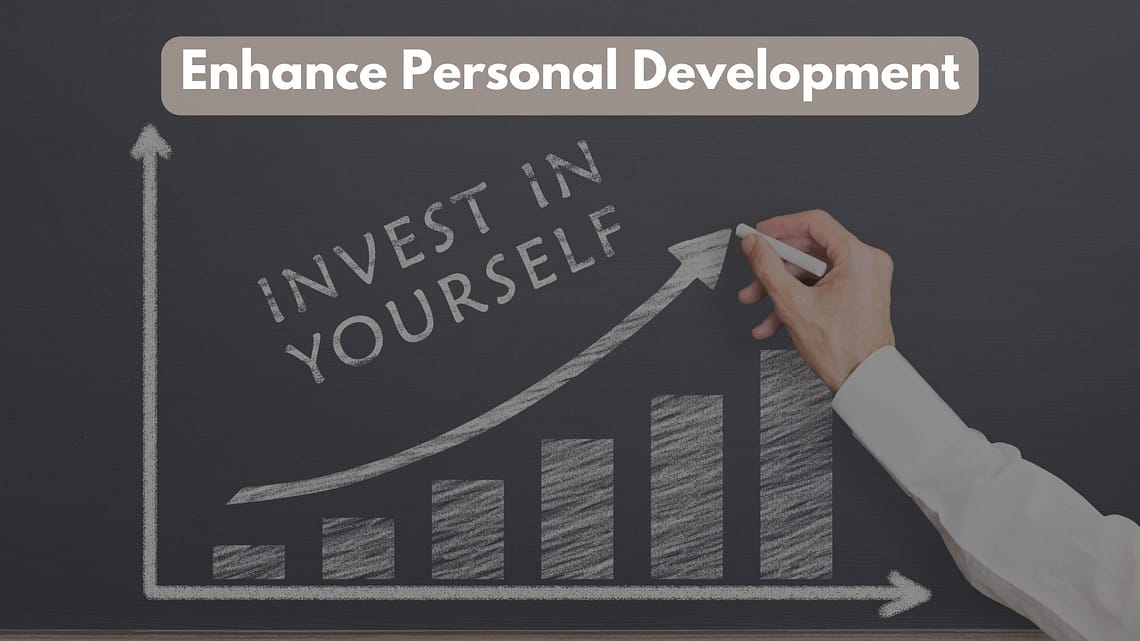Have you ever wanted to unlock your full potential and become the best version of yourself? In this article, we will explore some practical tips and strategies on how to enhance personal development.
By incorporating these techniques into your daily life, you will be able to improve your mindset, boost your confidence, and achieve your goals. So, let’s dive in and discover the path to personal growth and self-improvement!
Self-reflection
Identifying strengths and weaknesses
Self-reflection is a crucial aspect of personal development. Taking the time to reflect on your strengths and weaknesses allows you to gain a deeper understanding of yourself. It enables you to identify your unique talents and abilities, as well as areas where you may need to improve. By recognizing and acknowledging your strengths, you can build upon them and leverage them to achieve success in various aspects of your life. Similarly, understanding your weaknesses gives you the opportunity to work on them, turning them into strengths through intentional effort and practice.
Setting personal goals
Setting personal goals is an essential step in enhancing personal development. By identifying what you want to achieve in different areas of your life, you can create a roadmap for success. Personal goals provide direction and purpose, motivating you to strive towards continuous improvement. When setting goals, it is important to make them specific, measurable, achievable, relevant, and time-bound (SMART). This ensures that your goals are realistic and attainable, increasing your chances of success. By regularly evaluating and adjusting your goals, you can stay on track and make progress towards personal growth.
Identifying areas for improvement
No one is perfect, and there is always room for improvement. Identifying areas for improvement is a key component of personal development. It requires honest self-assessment and a willingness to acknowledge areas where you may be falling short. Whether it’s improving your communication skills, time management, or developing more patience, recognizing these areas allows you to actively work towards growth and development. Embracing a growth mindset and seeking opportunities to learn and improve will help you continuously evolve and become the best version of yourself.
Continuous learning
Pursuing new knowledge and skills
Continuous learning is essential for personal development. It involves actively seeking out new knowledge and skills in areas of interest or relevance to your personal and professional life. This can be done through various means such as online courses, workshops, or even hands-on experiences. Moreover, by continuously acquiring new knowledge and skills, you broaden your horizons and open up opportunities for personal and career growth. Whether it’s learning a new language, mastering a new hobby, or acquiring technical skills, pursuing continuous learning keeps your mind sharp and enables you to adapt to ever-changing circumstances.
Reading self-help books
Self-help books are a valuable resource for personal development. They provide insights, guidance, and strategies for overcoming challenges, improving mental well-being, and achieving personal goals. Reading self-help books allows you to gain wisdom from experts in different fields and learn from their experiences. It can inspire self-reflection, motivate you to take action, and provide practical tools to enhance various aspects of your life. Whether you’re seeking guidance on productivity, emotional intelligence, or personal finance, self-help books offer a wealth of knowledge and inspiration.
Attending conferences and seminars
Attending conferences and seminars is a fantastic way to enhance personal development. These events bring together experts, industry leaders, and like-minded individuals, creating opportunities for learning, networking, and personal growth. Conferences and seminars provide a platform to gain insights into the latest trends, developments, and best practices in your field of interest. They offer workshops, panel discussions, and keynote speeches that can broaden your knowledge, challenge your perspectives, and inspire new ideas. Additionally, the connections you make at these events can lead to valuable mentorship opportunities and professional collaborations.

This image is property of images.pexels.com.
Also Check: How To Take On Fitness Challenges?
Building healthy habits
Prioritizing self-care
Prioritizing self-care is of utmost importance when it comes to personal development. It entails taking intentional steps to nurture your mental, emotional, and physical well-being. One effective way to achieve this is through regular exercise, adequate sleep, nutritious eating, and engaging in activities that bring joy and relaxation.
If you’re up for a challenge, consider joining a gym and incorporating an ACFT (Army Combat Fitness Test) calculator to track your strength and fitness progress.
Maintaining a balanced lifestyle
Maintaining a balanced lifestyle is essential for personal development. It involves finding harmony between different aspects of your life, such as work, relationships, hobbies, and personal growth. A balanced lifestyle ensures that you allocate time and energy to all areas that are important to you. It prevents burnout, promotes overall well-being, and allows you to pursue personal development without neglecting other aspects of your life. Striking a balance may require setting boundaries, practicing time management, and making conscious choices to prioritize what matters most to you.
Developing a positive mindset
Developing a positive mindset is a powerful tool for personal development. It involves cultivating an optimistic and constructive outlook on life, regardless of the challenges or setbacks you may encounter. A positive mindset helps to manage stress, increases resilience, and promotes a sense of gratitude and satisfaction. By reframing negative thoughts into positive ones, you can overcome obstacles with a solution-oriented mindset. Developing a positive mindset involves practicing self-affirmation, surrounding yourself with positive influences, and embracing a growth mindset that believes in your ability to learn and grow.
Seeking feedback
Soliciting constructive criticism
Soliciting constructive criticism is a valuable practice for personal development. It involves actively seeking feedback from trusted individuals who can provide objective insights into your areas of improvement. Constructive criticism helps you identify blind spots and discover areas where you can grow and develop. When seeking feedback, it’s important to create a safe and non-judgmental space that encourages honest and constructive input. By welcoming feedback, you demonstrate a willingness to learn, adapt, and continuously improve.
Actively listening to others
Actively listening to others is a key aspect of personal development. It involves giving your full attention to the person speaking, without interruption or judgment. Active listening enables you to understand different perspectives, gain insights, and learn from the experiences of others. It shows respect and empathy towards the speaker and fosters meaningful connections. By actively listening, you can absorb valuable information, broaden your knowledge, and develop stronger communication and interpersonal skills.
Accepting feedback without defensiveness
Accepting feedback without defensiveness is crucial for personal growth and development. When receiving feedback, it’s natural to feel defensive or take it personally. However, learning to remain open-minded and receptive to feedback is essential for self-improvement. It’s important to remember that constructive criticism is an opportunity for growth rather than a personal attack. By accepting feedback gracefully, you demonstrate humility, a willingness to learn, and a commitment to personal development. Embracing feedback with gratitude allows you to make positive changes and continually enhance your skills and abilities.
Embracing challenges
Stepping out of comfort zone
Embracing challenges and stepping out of your comfort zone is essential for personal development. Staying within your comfort zone may provide a sense of security, but it limits your growth and potential. By intentionally seeking out new experiences, taking risks, and embracing discomfort, you can expand your skills, knowledge, and personal boundaries. Stepping out of your comfort zone allows you to discover new strengths, build resilience, and develop a growth mindset. It may involve initiating conversations, tackling new projects, or exploring unfamiliar territories, all of which contribute to personal development and self-discovery.
Taking on new responsibilities
Taking on new responsibilities is a valuable way to enhance personal development. Accepting new challenges and responsibilities allows you to expand your skill set, demonstrate leadership, and develop expertise in new areas. By actively seeking opportunities to take on more significant roles or projects, you push yourself to grow and learn. It may involve volunteering for additional tasks at work, joining a committee, or taking on leadership positions in community organizations. Taking on new responsibilities showcases your commitment to personal development and opens doors for future growth and advancement.
Facing fears and setbacks
Facing fears and setbacks is an integral part of personal development. It takes courage to confront and overcome your fears and to bounce back from setbacks and failures. By acknowledging your fears and actively working to overcome them, you build resilience, self-confidence, and emotional strength. Moreover, Personal growth often comes from navigating challenges, learning from mistakes, and persevering in the face of adversity. Embracing failures as learning opportunities allows you to grow stronger and become more resilient, ultimately leading to personal development and success.
Developing emotional intelligence
Recognizing and managing emotions
Developing emotional intelligence is crucial for personal development. It involves being aware of your own emotions, as well as recognizing and understanding the emotions of others. By developing emotional intelligence, you can effectively manage your emotions and respond empathetically in various social and professional contexts. Emotional intelligence enhances self-awareness, self-regulation, motivation, and interpersonal relationships. It enables you to navigate conflicts, handle stress, and communicate effectively, ultimately leading to personal growth and improved relationships.
Building empathy and understanding
Building empathy and understanding is a cornerstone of personal development. Empathy involves putting yourself in someone else’s shoes and genuinely understanding their feelings and experiences. By cultivating empathy, you develop a deeper understanding of others’ perspectives and foster meaningful connections. Empathy allows you to communicate more effectively, resolve conflicts, and build stronger relationships. It also contributes to personal growth by expanding your worldview and promoting a more inclusive and compassionate mindset.
Improving communication skills
Improving communication skills is essential for personal development. Effective communication involves both listening and expressing oneself clearly and concisely. By honing your communication skills, you can articulate your thoughts and ideas effectively, build rapport, and foster understanding. Good communication skills enable you to navigate relationships, collaborate with others, and influence positive change. Whether it’s through written or verbal communication, developing this skill set allows for personal growth and success in various areas of your life.

This image is property of images.pexels.com.
Cultivating a growth mindset
Believing in the potential for growth
Cultivating a growth mindset is a powerful tool for personal development. It involves believing that your abilities and intelligence can be developed through dedication and hard work. Embracing a growth mindset enables you to see failures and setbacks as opportunities for learning and growth, rather than as fixed limitations. By believing in your potential for growth, you approach challenges with resilience and optimism. This mindset encourages continuous improvement, fosters creativity, and empowers you to reach your full potential.
Viewing failures as opportunities for learning
Viewing failures as opportunities for learning is a key aspect of personal development. Failure is a natural part of the learning process and should be embraced rather than feared. When you reframe failure as a stepping stone to success, you create a mindset that values learning over perfection. Each failure becomes an opportunity to reflect, adjust, and improve. By embracing failure and learning from it, you develop resilience, creativity, and adaptability. This approach accelerates personal growth and opens doors to new opportunities.
Embracing change and adaptability
Embracing change and adaptability is essential for personal development in a rapidly evolving world. Change is constant, and the ability to adapt is crucial for growth and success. By embracing change, you open yourself up to new experiences, perspectives, and opportunities. Adapting to change requires flexibility, resilience, and a willingness to learn and evolve. Embracing change and being open to new possibilities fosters personal growth, expands your skill set, and allows you to navigate challenges with confidence.
Setting boundaries
Learning to say no
Learning to say no is an important aspect of personal development. Setting healthy boundaries and knowing your limits is crucial for maintaining balance and personal well-being. By learning to say no, you protect your time, energy, and mental health. This enables you to focus on your priorities and prevents burnout from overcommitment. Learning to say no can be challenging, but it is a valuable practice that cultivates self-respect, assertiveness, and self-care.
Establishing work-life balance
Establishing work-life balance is essential for personal development. Balancing the demands of work and personal life allows for optimal well-being and happiness. It involves setting boundaries and allocating time to various aspects of your life, including work, family, hobbies, and personal growth. Additionally, by establishing work-life balance, you create space for personal development, self-care, and meaningful connections. It promotes overall satisfaction, reduces stress, and contributes to a healthy and fulfilling life.
Protecting personal boundaries
Protecting personal boundaries is crucial for personal development and well-being. Boundaries define what is acceptable and unacceptable behavior in various relationships and situations. By setting and enforcing personal boundaries, you communicate your needs and values, and protect your physical, emotional, and mental well-being. Personal boundaries promote self-respect, assertiveness, and healthy relationships. They help establish expectations and create healthier dynamics, ultimately leading to personal growth and improved overall happiness.

Networking and relationship-building
Expanding professional contacts
Expanding your professional contacts is valuable for personal development. Building a robust network allows you to connect with individuals in your industry or areas of interest, fostering opportunities for growth and collaboration. By expanding your professional contacts, you expose yourself to diverse perspectives, knowledge, and potential mentors. Networking can be done through professional organizations, social media, or attending industry events. Additionally, by nurturing these relationships and seeking out new connections, you create a supportive network that contributes to personal growth and professional success.
Seeking mentors and role models
Seeking mentors and role models is a powerful strategy for personal development. Mentors and role models provide guidance, support, and invaluable insights based on their personal and professional experiences. They offer advice, help you navigate challenges, and inspire you to reach your full potential. Seeking out mentors and role models who align with your goals and values allows you to learn from their wisdom, gain new perspectives, and accelerate your personal growth. Additionally, Building strong relationships with mentors and role models fosters personal development and can open doors to new opportunities.
Nurturing meaningful connections
Nurturing meaningful connections is essential for personal development and happiness. Meaningful connections are built on mutual respect, trust, and shared values. By cultivating relationships with family, friends, colleagues, and mentors, you create a support system that enhances your well-being and personal growth. Nurturing meaningful connections involves active listening, empathy, and investing time and effort into building and maintaining relationships. Additionally, Meaningful connections enrich your life, provide emotional support, and contribute to personal development in numerous ways.
Practicing mindfulness and self-awareness
Being present in the moment
Practicing mindfulness and being present in the moment is a valuable practice for personal development. Mindfulness involves intentionally paying attention to the present moment without judgment. By practicing mindfulness, you cultivate a heightened sense of self-awareness, reduce stress, and enhance overall well-being. Being present in the moment allows you to fully engage in experiences, improve focus and concentration, and develop a deeper understanding of yourself and others. Mindfulness practices such as meditation or mindful breathing can be incorporated into daily routines to promote personal growth.
Observing thoughts and emotions
Observing thoughts and emotions is an essential component of personal development. By cultivating self-awareness, you can become more attuned to your thoughts, emotions, and reactions. This awareness allows you to examine your patterns, beliefs, and triggers, helping you identify areas for growth and development. Additionally, Observing thoughts and emotions provides valuable insights into your inner world, enabling you to make conscious choices and respond more effectively to challenges. Journaling, self-reflection, and mindfulness practices can enhance this practice of observing thoughts and emotions.
Fostering self-compassion
Fostering self-compassion is vital for personal development. It involves treating yourself with kindness, understanding, and patience, especially during difficult times or when facing setbacks. Self-compassion allows you to offer yourself the same support and empathy that you would extend to a close friend. By fostering self-compassion, you cultivate a positive relationship with yourself, build resilience, and boost overall well-being. This practice encourages personal growth, enhances self-acceptance, and helps you bounce back from challenges with greater ease.
Conclusion
Enhancing personal development requires a holistic approach that encompasses self-reflection, continuous learning, building healthy habits, seeking feedback, embracing challenges, developing emotional intelligence, cultivating a growth mindset, setting boundaries, networking, and practicing mindfulness and self-awareness.
Additionally, by actively engaging in these strategies, you can foster personal growth, achieve personal goals, and create a fulfilling and purposeful life. Remember, personal development is a lifelong journey, and each step you take towards self-improvement brings you closer to becoming the best version of yourself. So embrace the process, be patient and kind to yourself, and enjoy the transformative power of personal development.





